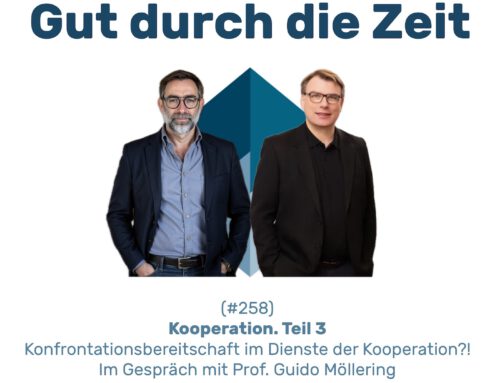INKOVEMA Podcast „Well through time“
#230 GddZ
The drama triangle
Stephen Karpman's model of psychological games.
A model from transactional analysis
In conversation with Thomas Wehrs
Studied practical philosophy, specialising in business ethics. As a coach and supervisor, he supports organisations, companies and people in change processes. Professional coach (DBVC) and coach and supervisor (EASC). Teaching transactional analyst (PTSTA-O).
Small series: From transactional analysis
Contents
Chapter
0:21 Introduction to the drama triangle
3:59 From podcast to the joys of life
4:42 Entry into the drama triangle
15:19 Change of roles in the drama triangle
20:59 The dynamics of the roles
27:35 Paradoxes in the drama triangle
31:38 Team processes and their challenges
40:31 Cognitive approaches in coaching
42:09 Options for exiting the drama triangle
43:49 The Pentagon game and organisations
45:55 Conclusion and outlook on future topics
Summary of content
In this episode, I discuss with Thomas Wehrs, an experienced transactional analyst and coach, the drama triangle - a central concept of transactional analysis that has proven particularly useful in various coaching and mediation situations. We begin with an introduction to the basic roles of the drama triangle: the victim, the persecutor and the rescuer, all of whom are linked in a dynamic interaction. These roles often emerge unconsciously in communication and team dynamics, and we show how they are linked and what impact they have on interpersonal relationships.
Thomas shares his practical experience and emphasises the importance of recognising one's own affective patterns and preferred roles in order to improve interpersonal communication. We discuss the challenge of dealing with the unconsciousness inherent in these role changes and how coaches can support these dynamics. We will also explore the Historical development of the drama triangle through Stephen Karpman and the Relevance of fairy tale structures in this theory.
It is also clearly explained that the application of the drama triangle is not only helpful in coaching, but also in mediation processes by helping the participants to recognise their patterns. We discuss the difficulties that can arise when communication is based on firmly defined roles. We also address how important it is to develop an empathetic understanding of the motivation behind the behaviour.
In this episode, it is particularly important for me to emphasise that the drama triangle is not a fixed set of roles, but rather a dynamic interaction that can change depending on the context. Our discussion concludes with the idea that it is essential for coaches and mediators to understand the depth and complexity of the drama triangle in order to bring about effective and meaningful change in their work.
Thomas and I also share our perspectives on the challenges that arise in the context of transactional analysis, particularly in relation to the balancing act between individual analysis and the application of the model in group or team settings. We realise that it is crucial to create opportunities to step out of the dynamics of unconscious roles and encourage more constructive communication.
Finally, we mention the concept of the game pentagon, which allows a deeper consideration of the drama triangle in organisational psychology contexts, and agree to explore this topic in more detail in a future episode.





Leave A Comment